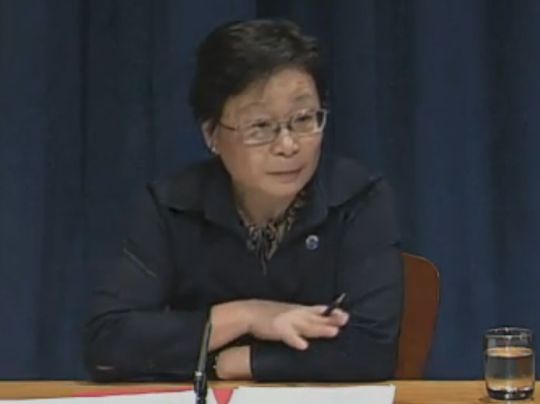Cote d’Ivoire: UN relief official reviews situation nine months after poll violence
Cote d’Ivoire: UN relief official reviews situation nine months after poll violence
 Assistant Secretary-General Catherine Bragg. UN Photo/Evan Schneider
Assistant Secretary-General Catherine Bragg. UN Photo/Evan Schneider
A senior United Nations relief official is in Côte d’Ivoire to assess the humanitarian situation after the bloody post-electoral crisis that rocked the country early last year and draw international attention to remaining challenges.
Catherine Bragg, Assistant Secretary-General for Humanitarian Affairs and Deputy Emergency Relief Coordinator, will also offer UN support to the Ivorian authorities to strengthen early recovery and longer-term development, notably in the western part of the country.
Focus will be on ensuring the return of internally displaced persons (IDPs) and refugees who were uprooted by the violence that erupted in Côte d’Ivoire in late 2010, when former president Laurent Gbagbo refused to step down after he lost the UN-certified election to Alassane Ouattara, who was eventually sworn in after Mr. Gbagbo surrendered in April last year.
Humanitarian priorities also include the implementation of the ongoing reform process in the area of security, disarmament, demobilization and reinsertion of former fighters into civilian life, as well as land tenure reform, the UN Office for the Coordination of Humanitarian Affairs (OCHA), said in a press release.
Ms. Bragg was joined today by the Ivorian Minister of State for Employment, Social Affairs and Solidarity, Gilbert Koné Kafana, and other UN officials for the launch of the $173 million appeal to fund humanitarian operations in support of more than three million people in need of assistance in the country this year.
“I applaud the return of over a half a million people in the last nine months, testimony to the increasing security and the resolution of the crisis and the international support, and a tribute to the hard work of the international community,” said Ms. Bragg.
“However, there are still substantial needs that require substantial resources to deal with persisting problems. This would allow voluntary and dignified return and pave the way for sustainable reintegration,” she added. Tomorrow she is scheduled to travel to western areas of the country to visit IDP sites.
Bert Koenders, the Secretary-General’s Special Representative and the head of the UN peacekeeping operation in Côte d’Ivoire (UNOCI), said that the security situation in the country was progressively improving nine months after the end of the post-electoral crisis, allowing IDPs and refugees to return to their villages.
###
About the United Nations Office for the Coordination of Humanitarian Affairs (OCHA)
OCHA is the part of the United Nations Secretariat responsible for bringing together humanitarian actors to ensure a coherent response to emergencies. OCHA also ensures there is a framework within which each actor can contribute to the overall response effort.
OCHA’s mission is to:
- Mobilize and coordinate effective and principled humanitarian action in partnership with national and international actors in order to alleviate human suffering in disasters and emergencies.
- Advocate the rights of people in need.
- Promote preparedness and prevention.
- Facilitate sustainable solutions.
How we deliver
OCHA’s Strategic Framework ensures that OCHA delivers on its core mandate, while responding to contemporary global challenges. The three pillars of the Strategic Framework are:
1. Partnerships: broadening the coalition for multilateral humanitarian action
The scale and scope of global challenges requires working together in new ways, with new partners. Partnership has always been integral to OCHA’s efforts. Sustained relations, built on trust and mutual respect, are vital when preparing for and responding to humanitarian emergencies. OCHA has a unique position within the international humanitarian system to convene and influence agendas. We will do this more strategically, with the aim of creating a more enabling environment for humanitarian action.
2. Service provider: building a better system
The expectations of OCHA have evolved since humanitarian reform. We will ensure that our services and support to partners also evolve and meet clients’ needs. We are focused on helping partners more predictably through humanitarian coordination leadership, strengthening coordination mechanisms, and improving the evidence base for humanitarian decision-making, planning and resource allocation.
3. Reliability and professionalism: creating better staffing and surge solutions to be there when it counts
In 2010, OCHA will introduce surge solutions to ensure the right people are on the ground immediately after a new disaster. This will be coordinated with longer-term staffing to ensure continuity of OCHA presence.
OCHA people
OCHA is its people. From 35 offices around the world, some 1,900 specialized and dedicated OCHA staff work to ensure that effective assistance reaches millions of humanitarian beneficiaries in four continents.

###
> United Nations (UN).
 The United Nations was established on 24 October 1945 by 51 countries committed to preserving peace through international cooperation and collective security. Today, nearly every nation in the world belongs to the UN: membership totals 192 countries.
The United Nations was established on 24 October 1945 by 51 countries committed to preserving peace through international cooperation and collective security. Today, nearly every nation in the world belongs to the UN: membership totals 192 countries.
When States become Members of the United Nations, they agree to accept the obligations of the UN Charter, an international treaty that sets out basic principles of international relations. According to the Charter, the UN has four purposes:
- to maintain international peace and security;
- to develop friendly relations among nations;
- to cooperate in solving international problems and in promoting respect for human rights;
- and to be a centre for harmonizing the actions of nations.
###
* The above story is adapted from materials provided by United Nations (UN)
** More information at United Nations (UN)




















